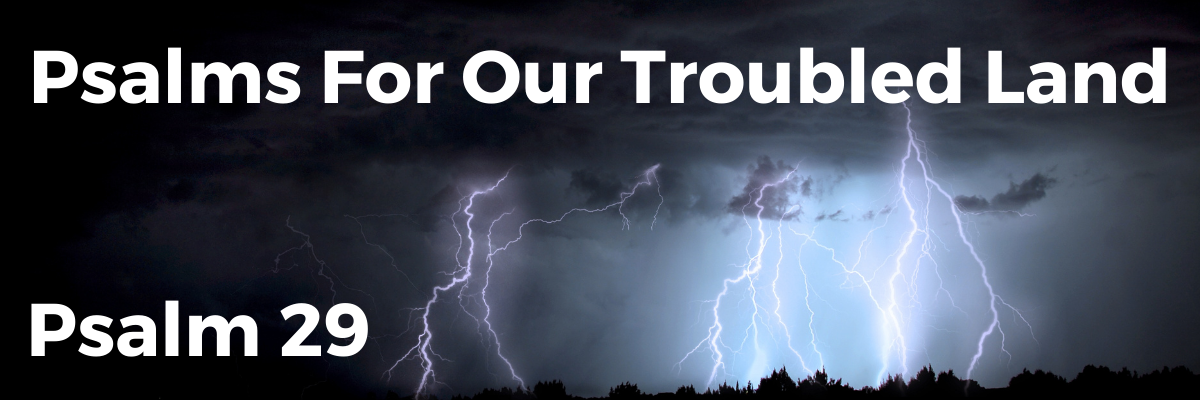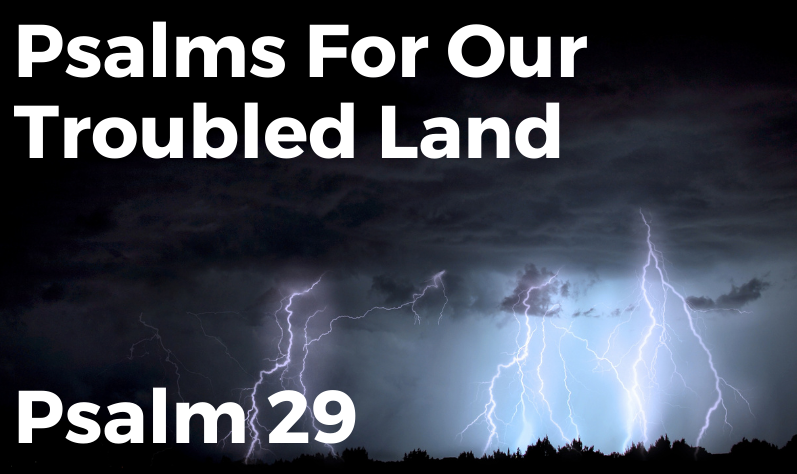Psalms For our troubled land
PSALM 29. THE VOICE OF THE LORD.

PSALM 29. THE VOICE OF THE LORD.
by The Rev Ross Anderson
Whenever I read this Psalm, I am reminded of my childhood in eSwatini (Big Bend) and my youth in the Ntonjaneni (Mthonjaneni) District (Zululand). Both areas are characterized by fierce thunderstorms with their accompanying lightning, heavy rains and sometimes hail. My two older sisters (Gill and Dawne) have vivid memories of lightning striking the rock faces above Mbabane (eSwatini), and I have an abiding memory of sleeping on a rock ledge in the Ntonjaneni district hearing the successive peals of thunder reverberating over the countryside as a threatening storm moved in. I miss those thunderstorms. Cape Town has only one or two rather pathetic thunderstorms a year. Though the Psalmist never lived in eSwatini or KZN, he too was familiar with the same thunderstorms, which he uses in this Psalm as a metaphor for “the voice of the Lord” and as a picture of God’s glory (v1), strength (v1), power (v4), majesty (v4) and God’s sovereign rule (v10). Be warned – this is a powerful Psalm that will leave you uncomfortable!
Not surprising. To be caught on the mountains, for example, on horseback (not a safe place to be in a thunderstorm), is both an exhilarating and humbling experience! Above all, the thunderstorm reminds the Psalmist of “the voice of the Lord”, a phrase he uses seven times in this short Psalm (can you spot all seven?). The “voice of the Lord”, like these thunderstorms, can bring life and healing and refreshing after a time of drought and famine, it can bring judgment and destruction (v5-9), and it can be discomfiting as we realize just how vulnerable we are.
Psalm 29 describes the thunderstorm as coming from the north (Lebanon and Sirion, or Mount Hermon, vv5-6) and passing overhead to vent its fury on the Desert of Kadesh in the far south (v8).
Like the Psalmist, the thunderstorms of my childhood and youth never evoked in me a fear of nature or a worship of nature, but they did speak to me of the Creator, the Lord, who is “enthroned as King forever” (v10). He is in total control of the elements.
Of course, the Psalmist is not writing literally; he is using a figure of speech. When he calls the thunder the “voice of the Lord”, he is using anthropomorphic language. This is often the case in the Psalms, which is, I think, one of the reasons why God’s people down the ages have identified so readily with the Psalms. For example, the wind is likened to God’s breath (Psalm 147), the heavens to the work of his fingers (Psalm 8), and the animals feed from his open hand (Psalm 104).
This is one of several nature Psalms. The Psalmist is interested in sun and stars (Psalm 8 & 19), thunder and lightning (Psalm 29), birds and beasts (Psalm 104) because they speak to him of the greatness and goodness of God. In Psalm 29, this is evident from the introduction and the conclusion.
Vv1-2 is a summons to the “mighty ones” to ascribe sovereignty to God. These mighty ones are, I think, angels (see Psalm 89:6 and Job 1:6; 2:1; 38:7). They ascribe to the Lord the glory due to his name (v2). Indeed, he is the God of glory, and his glory is partly experienced in the solemn magnificence of a thunderstorm.
The conclusion is a prayer that this same God will bless his people on earth (v11). Can he? Does he have the power to do so? Even in the chaos of present-day South Africa? Yes! His power to bless is undoubted, for he sits enthroned over the flood and reigns as King forever (v10). He is sovereign over both the elements and the affairs of people and nations. He is able to give to his people not only strength but peace (v10). Peace? Even in South Africa?
As we pray for peace in South Africa, we should remember that the “voice of the Lord” calls us to repentance and action:
- This same “voice of the Lord” calls us to love our neighbour (black, coloured, Indian, white, foreigner, visitor, homeless, refugee) as we love ourselves (Leviticus 19:18). And who is my neighbour? Only “the sons of your own people”? No, such a limitation does not apply to we who live post the death and resurrection of our Lord Jesus (cf. Luke 10:25-37). Yes, as Christians, we are called to care for those in the household of God, charity does begin at home, but our “neighbour” cannot be limited to fellow Christians only.
- The “voice of the Lord” calls us to live by the Spirit (Galatians 5:16-26), and the fruit of the Spirit includes love and peace.
- The “voice of the Lord” calls us to do justice (Psalm 10:18; 37:28; 146:7; Amos 5:24; Micah 6:8; Matthew 23:23; Hebrews 11:33). There are literally hundreds of such verses in the Bible – we tend to ignore them.
- The “voice of the Lord” calls us to care for the poor (Proverbs 19:17; Mark 10:21; Galatians 2:10; James 2:3). The vast majority of South Africans live in poverty.
May the voice of the Lord be not only over the waters (Psalm 29:3) but over us too. We should listen to his voice, obey his voice, and live by his voice – for he is “enthroned as King forever” (v10).
May the Lord give us strength, may the Lord bless us with peace (v11).
Psalm 29
Of David.
- The Lord is my light and my salvation — whom shall I fear? The Lord is the stronghold of my life — of whom shall I be afraid?
- When the wicked advance against me to devour[a] me, it is my enemies and my foes who will stumble and fall.
- Though an army besiege me, my heart will not fear; though war break out against me, even then I will be confident.
- One thing I ask from the Lord, this only do I seek: that I may dwell in the house of the Lord all the days of my life, to gaze on the beauty of the Lord and to seek him in his temple.
- For in the day of trouble he will keep me safe in his dwelling; he will hide me in the shelter of his sacred tent and set me high upon a rock.
- Then my head will be exalted above the enemies who surround me; at his sacred tent I will sacrifice with shouts of joy; I will sing and make music to the Lord.
- Hear my voice when I call, Lord; be merciful to me and answer me.
- My heart says of you, “Seek his face!” Your face, Lord, I will seek.
- Do not hide your face from me, do not turn your servant away in anger; you have been my helper. Do not reject me or forsake me, God my Savior.
- Though my father and mother forsake me, the Lord will receive me.
- Teach me your way, Lord; lead me in a straight path because of my oppressors
- Do not turn me over to the desire of my foes, for false witnesses rise up against me, spouting malicious accusations
- I remain confident of this: I will see the goodness of the Lord in the land of the living.
- Wait for the Lord; be strong and take heart and wait for the Lord.
- Wait for the Lord; be strong and take heart and wait for the Lord.
